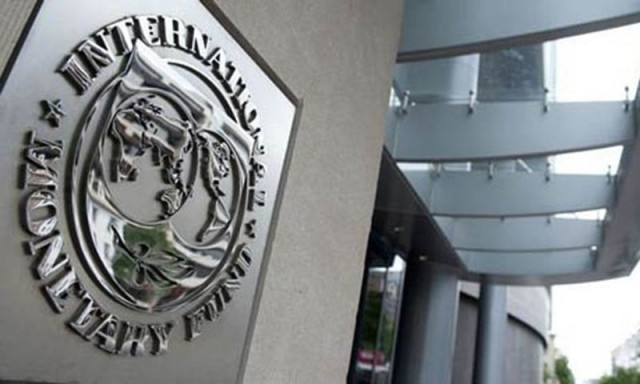Pakistan faces Rs3.3 trillion revenue black hole, says IMF
Country’s tax capacity estimated to be 22.3% of GDP, revenue gap of over 11%

Country’s tax capacity estimated to be 22.3% of GDP, revenue gap of over 11%. PHOTO: AFP
Due to administrative weaknesses, lower tax compliance and under-reporting, Pakistan is bleeding Rs3.3 trillion a year in revenue - an amount that is higher than this year’s total tax collection target - revealed an International Monetary Fund (IMF) report.
“Pakistan has the potential to mobilise additional tax revenues by an amount as much as, if not more than what it currently collects,” said the IMF in a ‘Selected Issues Paper’ that it released on Tuesday along with the ninth IMF review report.
Pakistan’s revenue collection surpasses target
Pakistan’s tax capacity is estimated to be 22.3% of Gross Domestic Product (GDP), which implies a tax revenue gap of more than 11% of GDP or Rs3.3 trillion, according to the report.
Pakistan’s current tax-to-GDP ratio is 11.5% and the difference between this ratio and the potential is the gap.
The Rs3.3 trillion revenue gap is six times higher than the amount of Rs500 billion that was mentioned for the first time by former finance minister Shaukat Tarin in 2009.
“Narrow tax base, extensive use of tax concessions and exemptions, weaknesses in revenue administration, low taxpayer compliance through informal economic activity and underreporting of formal income results in substantial loss of revenue relative to potential,” said the IMF.
Machiavellian approach to increase tax collection
The IMF added that the tax revenues in terms of the total size of economy peaked to 12.4% in 1996 during the PPP government, belying the claim of the incumbent government that the peak was achieved during its 1997-1999 tenure.
It also suggested Pakistan to broaden the tax base instead of burdening the existing taxpayers.
However, the IMF’s practical steps are contrary to its advice as it recently forced Pakistan to introduce a Rs40 billion mini-budget to bridge the shortfall that emerged against this year’s tax collection target.
“Simply aiming to increase revenue by further taxing already compliant taxpayers would worsen inequalities, undermine tax morale and cause distortions in economic activity,” noted the IMF.
Since June 2013, the PML-N government has imposed Rs940 billion additional taxes - an unprecedented figure.
The report further said that sustainable domestic revenue mobilisation would require a concerted agenda of well-defined reform efforts. “The government plans to increase the tax revenue-to-GDP ratio to 14.5% by 2020 to strengthen debt sustainability and resilience to fiscal shocks.”
Pakistan agrees to slap billions in new taxes
In its manifesto, the PML-N had vowed to increase tax-to-GDP ratio to 15% by 2018.
Intricate details
While highlighting tax gaps, the IMF said that the number of people registered for Personal Income Tax (PIT) was over 3.6 million in 2014, but it is still a very small figure compared to 56.5 million people employed in Pakistan. Furthermore, the number of active PIT filers is only 982,525, significantly below the number of 5.7 million people reportedly earning above the income tax threshold of Rs400,000.
The number of Corporate Income Tax (CIT) filers is 25,551 out of more than 60,000 companies registered for the CIT. Furthermore, the number of active CIT filers is a mere 0.8% of the number of commercial and industrial electricity users, which represent an illustrative pool of potential entities liable for taxation.
Likewise, the number of entities registered for the General Sales Tax (GST) is 178,190 out of about 1.4 million retailers and 3.4 million commercial and industrial electricity users.
“In order to improve taxpayer compliance and curb tax avoidance and evasion, the reform efforts must aim to modernise and bolster the effectiveness of tax administrations at federal and provincial levels, suggested the report.
Pakistan's corporate tax rate third highest in world
It said that for every property and financial transaction there should be a requirement to disclose a tax identity number. This would also help deal with the potential problem of using remittance transfers as a means of tax evasion.
While suggesting a way forward, the IMF said that fighting tax evasion should initially focus on a comprehensive list of high-wealth individuals and corporate entities.
It also advised on lowering the current income tax exemption threshold of Rs400,000. Since this is almost four times per capita income, a significant share of employed people does not pay any income tax at all.
There is also a need to strengthen the capital gains tax regime by adopting a common rate schedule for all financial assets and eliminating exemptions for real estate transactions.
Published in The Express Tribune, January 14th, 2016.
Like Business on Facebook, follow @TribuneBiz on Twitter to stay informed and join in the conversation.



















COMMENTS
Comments are moderated and generally will be posted if they are on-topic and not abusive.
For more information, please see our Comments FAQ